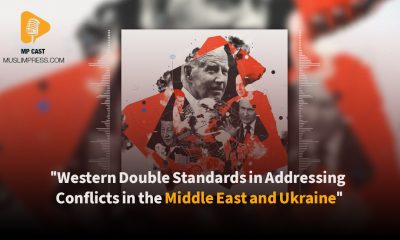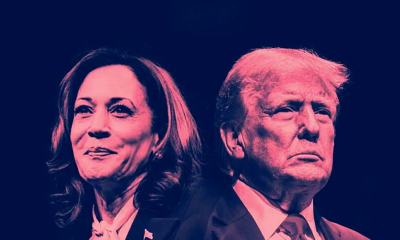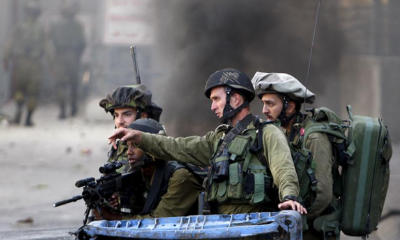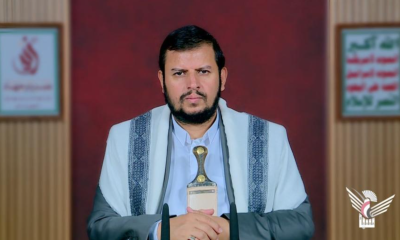Interview
Iran’s Anti-Hegemony Stance Strengthens, Cementing Its Role as Region’s Most Independent Nation

Muslimpress conducted an exclusive interview with Marwa Osman, a political commentator located in Beirut.
“The revolution in Iran had explosive international consequences,” she said, adding that the Islamic revolution “destroyed the U.S. political foothold in Iran and all the moves of the enemies of Iran in the last forty years were to counter the Islamic Revolution.”
Here’s the full transcript of the interview:
Since the Revolution, successive U.S. governments have sought to do all they can to counter its impact. Is the Trump administration doing the same?
Marwa Osman: The Islamic Republic destroyed the U.S. political foothold in Iran by its actions, and all the moves of the enemies of Iran in the last forty years were to counter the Islamic Revolution. At the top of that list is the USA. Sure, successive U.S. governments have sought to do all they can to counter its impact, but other proxies of the U.S. have done so. Israel is holding large military exercises to prepare for a future war against Iran. Saudi Arabia, fearing the rise of a “Hezbollah-like” group in Yemen, has waged a poo,rly run aggressive campaign against the Yemeni nation in an attempt to “thwart Iranian influence” while continuously increasing their war rhetoric against Iran. [Persian] Gulf states are spending billions on new weapons for the sole reason of supposedly “containing,g” Iran, and now President Donald Trump made everything worse by, in effect, reneging on Barack Obama’s nuclear deal with Iran.
What’s your take on Iran’s independence and its firm stance against hegemonic powers?
Marwa Osman: Among the objectives of the Islamic Revolution is resistance against arrogant powers and their oppression. The campaign against arrogance stems from Islam’s opposition to any type of oppression against others or yielding to oppression. In other words, on the one hand, Islam opposes oppression against others, and on the other hand, it advises people not to yield to oppression and fight it. And since this is the strategy that the Islamic Republic of Iran applies both in its internal ruling and external foreign policy, I believe the stance against hegemonic powers will only remain firm and become, the longer, making Iran by far the most independent nation in the region.
About forty years have passed since the people of Iran took to the streets and brought about the Islamic Revolution of 1979 under the leadership of Wilayat al-Faqih. What were the main factors that led to the Islamic Revolution?
Marwa Osman: A society torn between tradition and western modernity, poverty and prosperity, dictatorship and a yearning for democracy. The reasons are countless, but to answer the question in full one should not look at the 1979 Revolution as an isolated incident, rather, it was the culmination of over a century strife to end the dictatorial powers of monarchs, remove foreign influences from Iranian politics, distribute wealth while ensuring both economic prosperity and allowing for central guidance and control and create a constitution that was both democratic and would not alienate the traditional and religious portion of the population.
What was the significance of the Islamic Revolution and Wilayat al-Faqih’s role in it?
Marwa Osman: The world was surprised and astonished by the Iranian Revolution, which Ayatollah Ruhollah Khomeini led in exile in Paris. Iran’s Wilayat al-Faqih’s personality was critical in redefining Iran’s role in the region. Wilayat al-Faqih’s background, charisma, and thirst for revolting for the people of Iran influenced the atmosphere, leading to the Revolution. One can understand Khomeini’s personality and beliefs by examining his background. His devotion to Shia Islam, reflected by his simplistic ascetic lifestyle focused on spiritual matters, attracted the majority of Iranian society, which was stricken with poverty. Many of these traditional citizens flocked to the modern cities seeking opportunity, only to wind up crowded into slums. Imam Khomeini’s life of suffering and final return to Iran replicated a legacy of the Shia experience. Imam Khomeini unwaveringly opposed monarchy, arguing that only rule by a leading Islamic jurist as Wilayat al-Faqih would ensure the true Islamic ruling was properly followed.
Wilayat al-Faqih believed that Iran should strive towards self-reliance. He viewed certain elements of Western culture as being integrally crooked and a corrupting influence upon the youth. His ultimate vision was for Islamic nations to converge together into a single unified power, to avoid alignment with either side (the West or the East), and he believed that this would happen at some point shortly.
What were the immediate effects of the Islamic Revolution on the geopolitics of the region?
Marwa Osman: A broad coalition of opposition forces came together to overthrow a dictatorial regime, building on longstanding social grievances but also energizing nationalist sentiment against a state and ruler seen as too compliant to foreign interests. The immediate effect of the Islamic Revolution on the geopolitics of the region was, first and foremost, a classic populist alliance that would teach the modern world that steadfastness and unity within a nation can remove the oligarchy and obtain a healthy society.
What were the effects of the Revolution on Islamic political movements in the region and across the world?
Marwa Osman: The revolution in Iran had explosive international consequences. There were persistent attempts to export the Revolution to neighboring countries, which intensified regional rivalries and fostered conditions that led to interstate war. The Iranian Revolution’s efforts to promote its state interests and extend itself soon acquired resemblances to a reviving empire with traces of France and Russia in particular, not least the contradictory trends whereby some forces in the region were inspired by the Revolution while others drew on older antagonisms like Saddam Hussein’s labelling of Wilayat al-Faqih as a Zoroastrian priest and more recent concerns about a powerful new so called Shia “crescent” to try and enhance sectarian hatred in the region surrounding Iran to eliminate the chances of a revolutionary shock waves in the countries stricken by dictatorship mainly in the [Persian] Gulf.
Marwa Osman is a PhD Candidate located in Beirut, Lebanon. University Lecturer at the Lebanese International University and Maaref University, and former host of the political show “The Middle East broadcast on Al-Etejah English Channel. Member of the Blue Peace Media Network and political commentator on issues of the Middle East on several international and regional media outlets, including RT, Press TV, Al Manar, and Al Aala. Writings in several news websites, including Khamenei.IR, ModDiplomacy, Shafaqna, Italian Insider.

You may like
-


An anti-Semite is now someone Jews don’t like
-


“Western Double Standards in Addressing Conflicts in the Middle East and Ukraine”
-


Western media neither neutral nor responsible player in Gaza war: Author
-


“Harris-Trump Debate Sparks New Controversies in U.S. Political Landscape”
-


“Netanyahu’s Strategy Crumbles as Hezbollah Expands Battlefield: Refugee Crisis Worsens”
-


The inspiration of Iran’s Islamic revolution on Yemen’s Islamic resistance movements


Iran’s Anti-Hegemony Stance Strengthens, Cementing Its Role as Region’s Most Independent Nation

Israel will collapse when God fulfills Iranian nation’s ‘Death to America’ prayer: Albanian historian

Bloodshed in the Shadows: West Bank Crisis Deepens as Gaza Dominates Headlines

An anti-Semite is now someone Jews don’t like

Negotiations a way for coercive govts. to impose new demands that definitely won’t be fulfilled

Bloodshed in the Shadows: West Bank Crisis Deepens as Gaza Dominates Headlines

Israel will collapse when God fulfills Iranian nation’s ‘Death to America’ prayer: Albanian historian

Iran’s Anti-Hegemony Stance Strengthens, Cementing Its Role as Region’s Most Independent Nation

Jewish parties foreign policy

Will Israel adhere to its commitments under the ceasefire agreement?

“Western Double Standards in Addressing Conflicts in the Middle East and Ukraine”

“Harris-Trump Debate Sparks New Controversies in U.S. Political Landscape”

Challenges Facing the U.S. Navy: Addressing Gaps in Strategy and Capability

